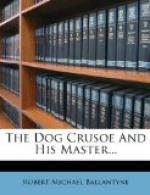So was it with our three friends upon this occasion. They were scarcely rid of the Blackfeet, who found them too watchful to be caught napping, when, about daybreak one morning, they encountered a roving band of Camanchee Indians, who wore such a warlike aspect that Joe deemed it prudent to avoid them if possible.
“They don’t see us yit, I guess,” said Joe, as he and his companions drove the horses into a hollow between the grassy waves of the prairie, “an’ if we only can escape their sharp eyes till we’re in yonder clump o’ willows, we’re safe enough.”
“But why don’t you ride up to them, Joe,” inquired Dick, “and make peace between them and the Pale-faces, as you ha’ done with other bands?”
“Because it’s o’ no use to risk our scalps for the chance o’ makin’ peace wi’ a rovin’ war party. Keep yer head down, Henri! If they git only a sight o’ the top o’ yer cap, they’ll be down on us like a breeze o’ wind.”
“Ha! let dem come!” said Henri.
“They’ll come without askin’ yer leave,” remarked Joe, dryly.
Notwithstanding his defiant expression, Henri had sufficient prudence to induce him to bend his head and shoulders, and in a few minutes they reached the shelter of the willows unseen by the savages. At least so thought Henri, Joe was not quite sure about it, and Dick hoped for the best.
In the course of half-an-hour the last of the Camanchees was seen to hover for a second on the horizon, like a speck of black against the sky, and then to disappear.
Immediately the three hunters vaulted on their steeds and resumed their journey; but before that evening closed they had sad evidence of the savage nature of the band from which they had escaped. On passing the brow of a slight eminence, Dick, who rode first, observed that Crusoe stopped and snuffed the breeze in an anxious, inquiring manner.
“What is’t, pup?” said Dick, drawing up, for he knew that his faithful dog never gave a false alarm.
Crusoe replied by a short, uncertain bark, and then bounding forward, disappeared behind a little wooded knoll. In another moment a long, dismal howl floated over the plains. There was a mystery about the dog’s conduct which, coupled with his melancholy cry, struck the travellers with a superstitious feeling of dread, as they sat looking at each other in surprise.
“Come, let’s clear it up,” cried Joe Blunt, shaking the reins of his steed, and galloping forward. A few strides brought them to the other side of the knoll, where, scattered upon the torn and bloody turf, they discovered the scalped and mangled remains of about twenty or thirty human beings. Their skulls had been cleft by the tomahawk and their breasts pierced by the scalping-knife, and from the position in which many of them lay it was evident that they had been slain while asleep.
Joe’s brow flushed and his lips became tightly compressed as he muttered between his set teeth, “Their skins are white.”




